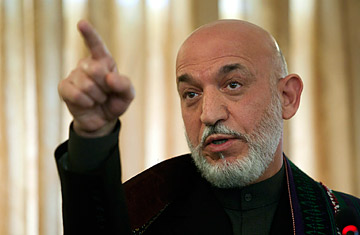
Afghan President Hamid Karzai welcomes his counterpart from Tajikistan, Emomali Rahmon, during a joint press conference at the presidential palace in Kabul on Oct. 25, 2010
Only those who have not been paying attention could see any kind of "Gotcha!" moment in reports that Afghan President Hamid Karzai has been receiving bags of cash from Iran. Karzai's response on Monday, Oct. 25, to the New York Times revelations to that effect was, essentially, a shrug: Sure, they give us money; so does the U.S. "This is a relationship between neighbors. And it will go on, and we will continue to ask for cash help from Iran."
Karzai, in fact, has never made any secret of his close ties with Tehran. He has repeatedly played host to President Mahmoud Ahmadinejad, an honored guest in Kabul, and made a high-profile visit to the Iranian capital last August to showcase the relationship (and his independence from Washington). Nor is there anything new or necessarily sinister in the relationship. Iran, along with Russia and India, was among the key regional backers of the Northern Alliance that had spent years fighting the Taliban before the 9/11 attacks and that had formed the core of Karzai's regime. Iran has long maintained close cultural, linguistic and political ties with Afghanistan's ethnic Hazara Shi'ite minority, concentrated in Western Afghanistan and Kabul. And Tehran almost went to war with the Taliban regime in 1998 when Taliban fighters murdered Iranian diplomats in the town of Mazar-i-Sharif.
The Islamic Republic actually supported and gave discreet assistance to the U.S. invasion of Afghanistan in late 2001 and helped create the Karzai government with the U.S. and other countries at an international conference in Bonn that December. The post-Taliban reconstruction of Afghanistan has seen massive infusions of Iranian aid — and a concomitant increase in influence. None of this has been secret. Moreover, the Obama Administration just last week welcomed Iranian participation in a meeting in Rome of the international "contact group" of stakeholders in Afghanistan's future. "We recognize that Iran, with its long, almost completely open border with Afghanistan, and with a huge drug problem ... has a role to play in the peaceful settlement of this situation in Afghanistan," said Richard Holbrooke, the Administration's special envoy for Afghanistan and Pakistan. "So for the United States, there is no problem with their presence."
Of course, participating in a policy discussion in Rome is not the same as purchasing support in the presidential palace in Kabul. But the principle of buying support in Afghanistan is well established. When U.S. covert operatives first invaded Afghan territory at the start of the war, the key weapons they carried were suitcases full of cash — in recognition of their power in the art of political persuasion in Afghanistan. And Karzai did not bother to deny the purpose of Tehran's donations to his presidential coffers. "They have asked for good relations in return, and for lots of other things in return. And we have also asked for lots of things in return in this relationship."
Iran's historical enmity toward the Taliban is based on the Afghan group's murderous hatred of Shi'ites, whom it deems apostates from orthodox Islam. Tehran's regional interests require good relations with key neighbors — particularly Afghanistan and Iraq, both of which happen to host tens of thousands of troops from Iran's archfoe the U.S. More sinister, perhaps, are the reports over the years that Iran may have been providing assistance to elements of the Taliban even as it shores up Karzai's government. That issue is doubtless among those raised by the Afghan President with his Iranian backers.
Karzai, of course, understands that if the Iranians have been enabling the Taliban's fighting capacity, they've been doing so not because they want to see the movement restored to power or are hedging their bets but as a means of sticking it to the U.S. That's why he stressed, following Ahmadinejad's most recent visit to Kabul, in March of this year, that his government "does not want a proxy war between Iran and the United States on Afghanistan. It does not want any country ... to engage in any activity against another country in Afghanistan."
No surprise, then, that his government is taking money from both Iran and the U.S. — and insisting that it will take orders from neither. If the latest reports are intended to signal that Afghanistan's government is not on board with the U.S. effort to contain Iranian influence in the region — well, Karzai has never made any secret of that fact. After all, he'll have to live with Iran on his border long after the Americans depart.
